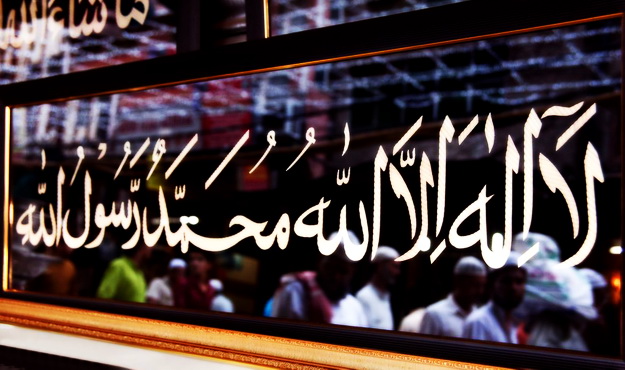In the grave the deceased will be tested with three questions. If they answer them correctly, they will be saved, and if not, they are doomed. One of these questions is “Who is your Prophet (Sallallahu alayhi wassallam)?” [The other two are: “Who is your God?” and “What is your religion?” [Ahmad]]
No one will be able to answer correctly except those who have fulfilled the conditions of this testimony, and those who Allah inspires with the answers and bestows upon him firmness in the face of this severe test.
These are the people who will benefit on that day when one’s money or relatives will be of no avail. The conditions of the testimony of ‘Muhammad (Sallallahu alayhi wassallam) is the Messenger of Allah (Muhammad-ur-Rasool-ullah)’ are as follows:
(1) Obedience to what the Prophet (Sallallahu alayhi wassallam) commanded, as Allah commands us to obey him: “Whoever obeys the Messenger, has obeyed Allah;” [4:80]
Allah (Subhanahu Ta’ala) also said: “Say if you love Allah, then follow me: Allah will love you and forgive your sins. Verily Allah is Forgiving and Merciful.” [3:31]
In addition to this, entering Paradise is conditional upon obedience to the Prophet (Sallallahu alayhi wassallam) as he said: “All of my community of followers will enter Paradise except for those that refuse.” They said: “O Messenger of Allah and who refuses?” He said: “Those that obey me will enter Paradise and those that disobey me refuse” [al-Bukhari].
Those that truly love the Prophet (Sallallahu alayhi wassallam) must obey him, since obedience is the natural outcome of love. Those who claim to love the Prophet (Sallallahu alayhi wassallam) and do not follow and obey him are not true to their claim.
(2) Belief in all what the Prophet (Sallallahu alayhi wassallam) informed us. Whoever believes which has been authentically confirmed to be of his statements as false out of desire has given lie to Allah and His Messenger (Sallallahu alayhi wassallam). The Messenger (Sallallahu alayhi wassallam) was protected from erring in religion, as Allah (Subhanahu Ta’ala) said : “He doesn’t speak from his own inclination. It is indeed a revelation revealed (to him from Allah).” [53:3-4]
(3) Avoiding everything he prohibited and reproached. The first and foremost thing that must be avoided is shirk, then the major sins, ending with the lesser sins as well as those things that are makrooh (disliked). The more the believer loves the Prophet (Sallallahu alayhi wassallam), the more his faith increases. When a believer’s faith increases, Allah places within him the love to perform good deeds and the hate of disbelief, wickedness and disobedience.
(4) Not worshipping Allah except by what has been legislated by His Prophet (Sallallahu alayhi wassallam). This issue is critical, for it is not allowed to worship Allah by any act except what has been shown by His Messenger (Sallallahu alayhi wassallam), as he said: “Whoever innovates an act of worship in our religion, that thing is rejected” [Muslim]
Thus, all types of unprecedented worship is not acceptable to Allah.
Note: Be certain that loving the Prophet (Sallallahu alayhi wassallam) is an obligation. Rather, it is not enough that one merely loves him; one should love him more than everything else, even his own self. If someone loves something, they prefer it over theirself and strive to be in agreement with it. Thus, the one who truly loves the Prophet (Sallallahu alayhi wassallam) is the one upon whom this love can be seen. He obeys him, implements his Sunnah, implements his commands and imitates his deeds. He stays clear from what he forbids, tries to behave like him both in times of ease and hardship, and in times when he feels motivated to practice Islam and otherwise. Obedience is the fruit of love, and without it, love can never be true.
There are signs which show that one loves the Prophet (Sallallahu alayhi wassallam). From them are the following:
1) Mentioning him a lot and sending praises upon him. If one loves something he mentions it often.
2) Longing to meet him. Anyone who loves another longs to meet his beloved.
3) Respecting him when he is mentioned. Ishaq said: The Companions of the Prophet (Sallallahu alayhi wassallam) would not mention him after his death except that they would fall still, the hairs of their skin would stand, and they would weep.
4) Hating those who Allah and His Messenger (Sallallahu alayhi wassallam) hate, and showing enmity to those who show enmity to them. One also should stay away from those who oppose his Sunnah and introduce new matters in his religion, such as the people of innovation (bid’ah).
5) Loving those who the Prophet (Sallallahu alayhi wassallam) loved, such as the believing members of his family, his wives, and his companions from the Emigrants (Muhajiroon) and the Helpers (Ansar). One should hate those who hate them, take as enemies those who show enmity to them and curse them.
From the signs that one loves the Prophet (Sallallahu alayhi wassallam) is that one emulates his noble character and qualities. The Prophet (Sallallahu alayhi wassallam) was the most noble of humans in character. Aishah (radhiAllahu anha) said of him, “The character of the Prophet (Sallallahu alayhi wassallam) was that of the Quran,” [Muslim], meaning that he kept himself from committing any act which the Quran did not command. He was the bravest of people, and he would be most brave at times of battle. He was the most generous of people, and he would be most generous in Ramadan. He was the most sincere towards others and the most forbearing of people. He never sought revenge for himself, but at the same time, he was the strictest of people in regards to the commandments of Allah. He was the most humble of people and tranquil. He was shyer than a secluded virgin. He was the best of people to his family, and the most merciful of people towards the creation, and encouraged others to have mercy as well.
O Allah! Send your praises upon him, his family, his wives, his companions and those who followed them in righteousness until the Day of Resurrection, and remove them from all harm.
 navedz.com a muslim's Quest for the truth
navedz.com a muslim's Quest for the truth








One comment
Pingback: Testimony that Laa llaaha Illa-Allah - navedz.com